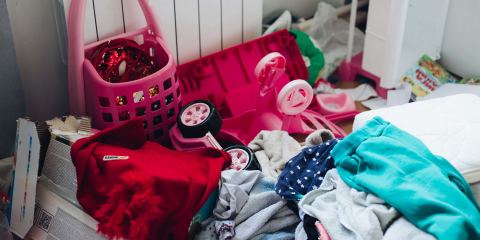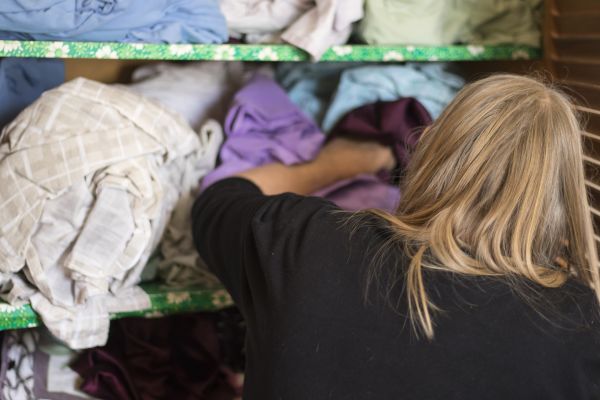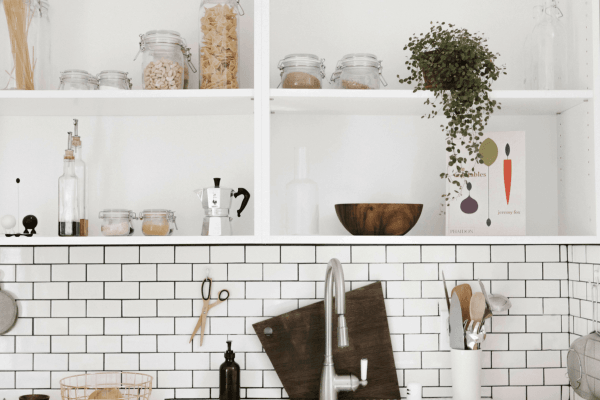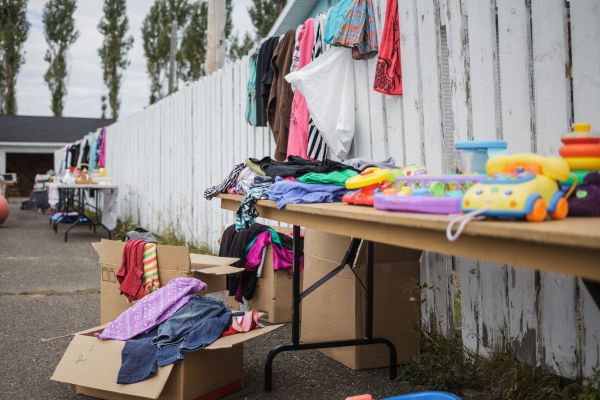Whether you don’t mind a little disarray or you care a lot about how clean and tidy your home is, clutter has an effect on your brain. If you find yourself feeling frazzled around the house, clearing up your clutter—even if it’s just a few items!—can be a quick way to re-introduce some order and calm those jangled nerves.
It may come as no surprise that our external environment can impact our internal one, especially if you’ve ever noticed your mental health and the cleanliness of your house seem to be linked.
There is more and more research to support the belief that clutter can negatively impact mental well-being. Clutter can:
- Make you feel overwhelmed and less focused
- Make decision-making more difficult
- Cause stress and conflict
- Impact physical health, mental health, and sleep
Let’s take a look at how exactly clutter accomplishes these things, and how to keep your house from getting cluttered in the first place.
1. Clutter can make you feel overwhelmed and lose focus
According to Dr. Ferrari, a professor of psychology at DePaul University, “clutter is an overabundance of possessions that collectively create chaotic and disorderly living spaces”.
Some people thrive in a cluttered and chaotic environment, but for many of us, a build up of stuff can easily overload our senses simply because of the sheer number of items your brain needs to process and organize. When you are unable to make sense of a situation—including clutter—your brain can quickly begin to feel overwhelmed and shut down. This can make it difficult to focus, especially if you work from home. So if you find yourself a little less productive than usual, take a moment to tidy your desktop or put away a few items around your home.
2. Clutter can make decision-making more difficult and causes bad judgement
When you’re feeling overwhelmed and unfocused, it’s harder to make sound decisions and you may even be more likely to make the wrong choice, or one that you’ll regret later.
You may have been in a situation in the past where you were overwhelmed by your to-do list or your environment and agreed to something you later regretted, or perhaps made an impulsive and unnecessary purchase. If you can relate to this, don’t worry—we’ve all been there! Clutter in your home can contribute to this effect because it confuses your brain with too much visual information.
Clutter can also make you more likely to feel overly confident in your impulsive and poor decisions. Did you really need that mini waffle maker or mermaid tail blanket? Probably not. Do you feel good about it anyway? Most likely yes, at least in the short term.
3. Clutter can cause stress and conflict
In addition to serving as a visible reminder of all the things you have to do, clutter has been linked to an increase in cortisol levels (the “stress hormone”) and is often a source of conflict if you live with someone else.
Studies have shown that clutter can be especially stressful for women—according to Dr. Saxbe, “women [...] who described their home as being cluttered or needing work began their day stressed and remained stressed. Some of the added stress, she suspects, was tied to women’s tendency to take on housework and extra chores after the workday”.
If you’re feeling more stressed out than usual, taking a moment to tidy your home or even taking on a larger decluttering clean-out can leave you feeling calmer and more collected. If the idea of adding another thing to your to-do list stresses you out, even more, don’t be afraid to contact a professional home organizer to help tackle your clutter.
4. Clutter can impact physical health, mental health & sleep
In addition to stress, people who live in cluttered homes are more likely to report being depressed and fatigued, while people with clean homes are reported to be healthier and happier. On top of that, made beds and clean sheets (two hallmarks of an uncluttered home) have been shown to improve sleep.
If you are finding it difficult to get your house clean or are unable to tackle the process on your own, don’t be afraid to reach out for help. Friends, family, and professional organizer services are available to help you control your clutter and get back on your feet. Whether you need help downsizing for a move, are overwhelmed with too much stuff, or just need some general assistance getting your home in order, our nationwide network of professional organizers can help you tackle any organization project.
How to declutter & clean your home
If you’ve decided to declutter your home and cull your belongings, begin by sorting through your stuff and deciding what to keep, what to donate, and what to dispose of. You can tackle this room by room or even by type of belonging, such as:
- Paperwork
- Clothing and other wearables
- Books, magazines, and comics
- Records, CDs, and tapes
- DVDs, BluRays, and VHS tapes
- Kitchenware
- Craft and hobby supplies
- Cosmetics, hair, and hygiene products
If you’re not sure how to approach your clutter, start small. In a very messy home with lots of belongings, it can be overwhelming to dive in and begin. Instead of tackling the whole project in one go, do a little bit every day, even if it’s just five minutes.
PRO TIP: Dr. Ferrari recommends having someone help you with the decluttering process. Have them show you the item and ask if you want to keep it, because “once you touch the item, you are less likely to get rid of it.”
Once you have sorted through your belongings, make sure to actually follow through on donating and disposing of the items you have decided to part with. Don’t let these items sit for months, taking up space in your home and creating more clutter! If you feel like it will be hard to do, arrange for a friend, family member, or even a company that collects donations to come and pick it up for you.
Make sure the items you’ve decided to keep are organized and have a designated place in your home. Dedicated locations will make it easier to make a habit of putting items back where they belong, which makes it much easier to keep your home tidy after you declutter.
TSI TIP: To keep your home organized after you declutter it:
- Shop consciously
- Create a simple and easy-to-stick-to organization system
- Share the organization system with every member of your household
- Don’t fill up every container
- Make organization a habit
- Be kind to yourself if it doesn’t work perfectly
Check out this blog post for more advice on how to keep stay organized after a declutter.
Conclusion
On top of looking disorganized and unsightly, studies have shown that a cluttered home can affect you in many ways. Clutter can:
- Make you feel overwhelmed
- Make decision-making and focusing more difficult and cause poor judgement
- Cause stress and conflict
- Impact physical health, mental health, and sleep
Taking some time to tidy away your belongings or even undertake a complete decluttering of your home can add some much-needed calm to your life, especially if you find yourself spending more time at home.
Check out our Organization category for more tips.
Need help getting organized?
TSI’s professional organizers can help you with any home organization project.




